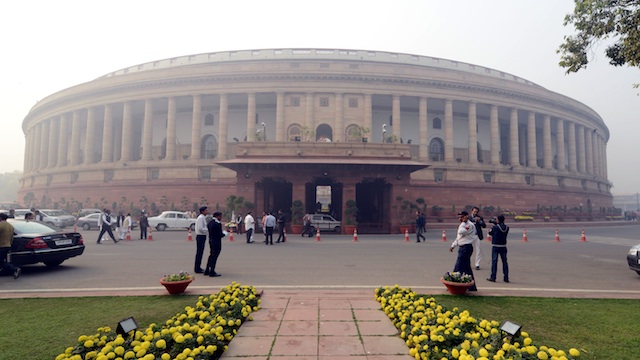SUMMARY
This is AI generated summarization, which may have errors. For context, always refer to the full article.

NEW DELHI, India – India’s parliament Wednesday, December 18, passed a law to create a powerful anti-graft watchdog following a mass anti-corruption movement that swept the country two years ago and galvanized politicians into action.
The ruling Congress and main opposition Bharatiya Janata Party (BJP) showed rare unity in the lower house of parliament to approve the bill creating a corruption ombudsman with sweeping powers to prosecute all politicians and civil servants.
“It is historic and landmark legislation,” Prime Minister Manmohan Singh declared after the Lokpal or ombudsman bill was passed.
The bill’s approval comes as general elections loom early next year and as the electorate has become increasingly incensed over a string of corruption scandals that have engulfed the nation.
All ministers and senior public servants are covered by the bill, first proposed nearly five decades earlier, and even the prime minister falls under the scope of the law.
A stunning performance in state polls by an upstart party, whose mission is to clean up pervasive corruption and create a “bribe-free India,” underscored the potential damage the issue would cause major parties at the ballot box next year, giving them extra motivation to pass the bill.
Civil servant-turned-corruption fighter Arvind Kejriwal and his Aam Aadmi Party or Common Man Party trounced the Congress party in Delhi state polls this month and deprived the BJP of a majority.
The Congress-led national government has been hit by a string of multi-billion-dollar corruption scandals from allegations of illegal distribution of cut-price telecom licences to the 2010 graft-tainted Commonwealth Games.
The father of the anti-corruption campaign, 76-year-old social crusader Anna Hazare, drank coconut water to break a nine-day fast that he was staging to push for the bill in his home village in western Maharashtra state after the legislation was passed.
“This has been for the country… it has been a lot of work by a lot of people,” Hazare told a sea of jubilant supporters waving green, white and orange Indian flags.
Hazare, who styles himself after independence icon Mahatma Gandhi, declared he would form “watchdog bodies” made up of “retired judges, state police chiefs and other people with impeccable integrity” to keep a watch on how the law is enforced.
Hazare and Kejriwal, once close allies, have since had a bitter falling out with the elderly activist accusing the one-time tax inspector of unauthorized use of funds from their civic movement and of his name in promoting the Aam Admi Party. Kejriwal has denied the charges.
Kejriwal, 45, was a key member of the grass-roots movement that demanded the tough law back in 2011 but legislation was stalled by political bickering and debate about the extent of the bill’s scope.
BJP house leader Sushma Swaraj praised “the people of this country” for achieving passage of the bill, but added the main credit should go to “the old and fragile man Anna Hazare who has been fasting for so many days to press for competent anti-corruption legislation”.
The Lokpal Act, cleared by India’s upper house Tuesday, December 17, and now set to go to the president for formal approval, will serve as a model law for India’s states which will have to set up their own anti-corruption bodies.
The bill’s critics have voiced worry about creating an agency with sweeping powers to investigate ministers and civil servants.
Under the legislation, those guilty of criminal misconduct and “habitually abetting corruption” could face 10 years in prison.
Some critics suggested the bill will make government policymakers reluctant to take any decision for fear of corruption charges.
The major dissenter to the act Wednesday was the regional Samajwadi party whose chief Mulayam Singh Yadav called the legislation “a dangerous bill” that “will paralyze decision making”. – Rappler.com
Add a comment
How does this make you feel?
There are no comments yet. Add your comment to start the conversation.